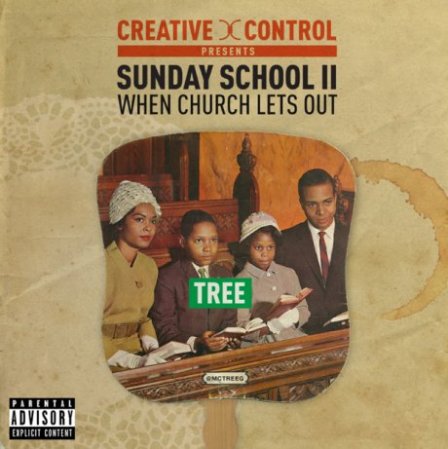Cabrini-Green-raised MC/producer Tree had already developed and begun to master a sound all his own by the time he dropped the first Sunday School mixtape in March 2012 (if you’re unfamiliar with his earlier work, check out Pluto, The 3rd Floor and The Tree EP to hear how his style had progressed up to that point). With this release, his name was catapulted into rap blog superstardom (yes, there is such a thing) along with the compound word he’d created — soultrap — to describe his production style. The mixtape was covered by MTV and SPIN, among others, and was included in numerous year-end lists and features.
Fans who identified specifically with the “rawness” of Tree’s off-kilter sampling might’ve raised eyebrows at some of the beats used on subsequent EPs The Lit and Trillin (both of which were produced entirely by outside parties), even if New Year’s Eve mixtape Tree Featuring the City offered reassurance that the soultrap sound wasn’t leaving town just yet. Then the Sunday School II singles started coming out, starting with “Get It” (which was later renamed “Devotion”), followed by “Trynawin” featuring Roc Marciano, “No Faces” featuring Danny Brown, and finally “The King.” While none of these tracks marked a drastic departure from the sonic foundation of the first Sunday School, all of them present a slightly more polished exterior, with the samples sounding less choppy and the mixing/mastering quality having been noticeably improved. Therefore, one could’ve been forgiven for suspecting that the lo-fi charm that helped make Tree’s previous work so great was on its way out the door. On the other hand, each of these newer songs hinted at a natural progression for soultrap, as if rather than let it stagnate in its existing form or downgrade through simplification, Tree had decided to assimilate those common studio techniques that best suited his individual sound while continuing to experiment using the various tools already at his disposal. This proves to be the case on Sunday School II’s first two tracks: “Safe to Say” and “FAME.”
Whereas “Safe to Say” showcases the MC sermonizing over a church organ/boom-bap drum kit combo courtesy of fellow Chi-town producer Tye Hill, “FAME” is perhaps the most intricate soultrap proffer to date, with a sped-up Billie Holiday sample so thinly sliced and completely rearranged it might as well have been cranked out of a broken music box. And while the latter provides plenty of room for Tree to have fun switching vocal patterns as he’s prone to do, the former finds him equally at home. In fact, it’s not even a matter of “Can he flow comfortably over a boom-bap beat?” He flat-out murders it, with two skillfully crafted and viscerally delivered verses setting the stage for the rest of what is doubtlessly Tree’s most cohesive full-length to date. This overarching cleanliness should not be mistaken for dullness, though. There are still plenty of moments of madcap experimentation, and ordo-ab-chao breakthroughs abound, perhaps even more so than before: peep the perpetually shifting cadence employed on “Thankful,” a song introduced by an autobiographical anecdote about a run-in with a forgiving police officer; the perfect placement of each syncopated sample and syllable on “Trynawin,” still one of the most imminently enjoyable tracks of the year; and the full-on balladry of “Project Parties,” whose old vs. new conflict and matter-of-fact resolution form a microcosm of the album’s central themes.
Fittingly, it’s on “Most Successful” that Tree is most successful at incorporating the best of all the above. An introspective, inspirational, and immediately accessible celebration of personal achievement, the track’s potency lies in its sincerity and clarity. And while its hook is among the catchiest on the whole mixtape, Tree still manages to cast himself as an MC’s MC with the closing line, “The realest shit I ever said is probably never wrote.”
Amen.

